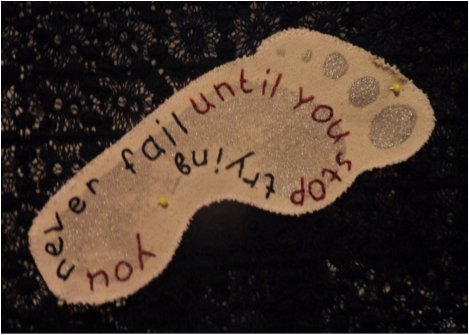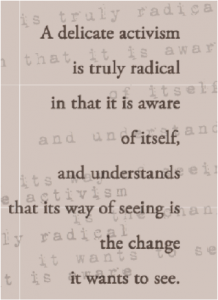I am an activist(?)

My connotation with activism is aggression and tension. Perhaps you have the same, perhaps you are surprised reading it. I am certainly intrigued, because I would say I am an activist, but writing (or saying) this causes discomfort in me. Most activists I know, including myself, have no aggression in them, and I respect those who do. The past week of classes we often came back to the question what you see as your role in the world. For me this revolves around the question of what activism is, and why I feel that discomfort. I will share my explorations below.
Door Inge Schrijver
Conservative, delicate, radical?
 From a thought provoking and highly-recommended piece A Delicate Activism. I took a warning to become too certain of your own right and to be open to being changed. They warn for activism itself becoming conservative. The conviction of being right and determination of changing what is wrong can make us blind to flaws or limits in our own understanding. I certainly fall into that trap sometimes. Reflection is a key way to question your actions and change your ways, while a lack of it often leads to a tendency to hold on, to conserve, to deny risk.
From a thought provoking and highly-recommended piece A Delicate Activism. I took a warning to become too certain of your own right and to be open to being changed. They warn for activism itself becoming conservative. The conviction of being right and determination of changing what is wrong can make us blind to flaws or limits in our own understanding. I certainly fall into that trap sometimes. Reflection is a key way to question your actions and change your ways, while a lack of it often leads to a tendency to hold on, to conserve, to deny risk.
What is more, commitment to changing society risks sliding towards instrumentalism and management, as the authors describe: having objectives, strategizing, making elaborate plans to find the shortest way to quantifiable results, and bureaucratic accountability and performance indicators. With management as a solution and simplification as quick fix, there is a danger that activism becomes a tool of efficiency, instead of a path of deep and transformational change. Our human quest is not a mechanical problem that can be solved without inner movements of transformation. The future you want can only emerge from the way you act in the present.
[perfectpullquote align=”full” cite=”” link=”” color=”” class=”” size=””]“To act (where many others don’t) and yet to question that action – in the very name of that action – while acting, is the sublime fulfilment of what it is to be human – to be in open conversation with one’s world at all times. It implies a sensibility that transcends itself, and that therefore has the possibility of acting as the seed of a more conscious future.” (A Delicate Activism)[/perfectpullquote]Insights from Hannah Arendt
 This connects with the tip of the iceberg of Hannah Arendt’s thoughts we discussed in class. Arendt distinguishes between making (what she calls work) and acting. Making happens when a craftsman forces raw material to conform to his/her model, where the material has no say in the process. This is the same for human beings cast as raw material to create a new society or make history.
This connects with the tip of the iceberg of Hannah Arendt’s thoughts we discussed in class. Arendt distinguishes between making (what she calls work) and acting. Making happens when a craftsman forces raw material to conform to his/her model, where the material has no say in the process. This is the same for human beings cast as raw material to create a new society or make history.
It is misleading to think about “Man” making his own history, as there is no such person: “men, not Man, live on the earth and inhabit the world”. We are all distinctly different, and politics should take this seriously rather than search for rational theoretical principles. Each of us is capable of actions, initiating something new, and of new perspectives, that will not fit a tidy predictable model unless these political capacities are crushed.
Moreover, Arendt identifies thoughtlessness as one of the outstanding characteristics of our time. We are too absorbed in consumption to take any responsibility for the human world or to understand our political capacities. She mentions a paradoxical situation: radical economic processes were set off by human action, but those concerned increasingly consider themselves helpless on the currents of socioeconomic forces.
[perfectpullquote align=”full” cite=”” link=”” color=”” class=”” size=””]“There are no environmental problems, there are only environmental symptoms of human problems” (Robert Gilman)[/perfectpullquote]To act
 Arendt draws hope from new people entering the world (you, me, us!), each unique and capable of initiating interruptions to the events set in motion by previous action. At the same time she acknowledges the other side of the coin: because of the unpredictability of action, there is a lack of control over its effects. This is exactly what paralyses me sometimes. I’m afraid of failing or causing unintended consequences. During a Craftivism workshop last semester we got to stitch our own footstep, to encourage self-reflection and discussion. I look at mine every day to remind me that sometimes you need a bit of courage to act (thoughtfully).
Arendt draws hope from new people entering the world (you, me, us!), each unique and capable of initiating interruptions to the events set in motion by previous action. At the same time she acknowledges the other side of the coin: because of the unpredictability of action, there is a lack of control over its effects. This is exactly what paralyses me sometimes. I’m afraid of failing or causing unintended consequences. During a Craftivism workshop last semester we got to stitch our own footstep, to encourage self-reflection and discussion. I look at mine every day to remind me that sometimes you need a bit of courage to act (thoughtfully).
Where does this lead me to?
From all of the above and more I came to some resolutions. I will try:
- to really listen to others, especially those who have different views
- to be open to expose my assumptions and change my opinion – especially with familiar patterns of thought and behaviour and those beliefs I have had for a long time.
- not to judge or become angry, but see differences and try to understand and accept them.
- to let go of the urge to control the course of events and see immediate effect of my unique contributions rather than of the collective.
- to reflect on how I work and who is excluded from conversations.
- to feel my emotions and what I need, to prevent a burn-out.
I would like to see activism as space to experiment and experience the world I’m trying to bring forth. Not just as part of social movements, but in daily life too; not conforming to what we are supposed to do and following established patterns, but living a life I want to. It can be quite awkward and a struggle trying to be human, but well worth spending a lifetime on.
I will continue to think about these issues guided by two questions: How can we speak out against injustice without reinforcing separation or mimicking the system we are trying to change?; How would a campaign look like if it did not have specific target, but the campaign itself was the goal?
[perfectpullquote align=”full” cite=”” link=”” color=”” class=”” size=””]“Activism lies at the heart of our humanity; our striving for a better future is the essence of our humanity.” (A Delicate Activism)[/perfectpullquote]If you want to find out more:
- A Delicate Activism: quite a long piece, but just reading the first paragraphs is already intriguing
- Hannah Arendt’s book The Human Condition, we read the introduction by Margaret Canovan
- Film Hannah Arendt, revolving around the Eichmann trial in Jerusalem and coining of the term “the banality of evil”
- Tim Ingold on carpentry: The Textility of Making
- John Shotter on withness-thinking versus aboutness-thinking, e.g. this text
- Susan Piver: 5 ways not to bite the Trump hook
- Patricia Shaw’s book Changing Conversations in Organisations: A Complexity Approach to Change
